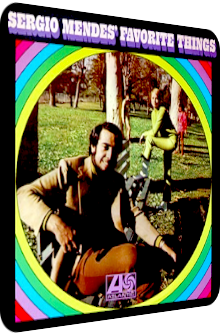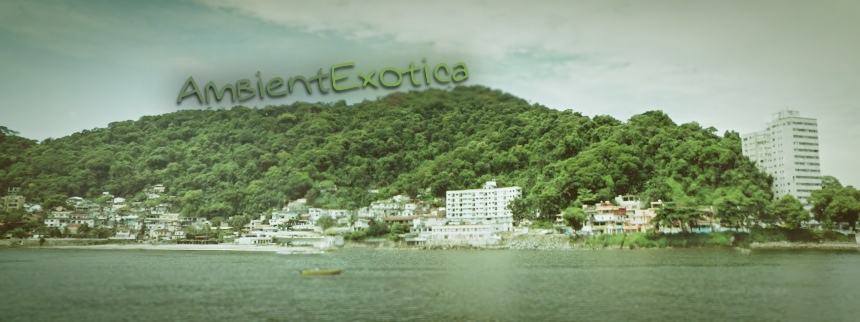
Sérgio Mendes
Favorite Things
1968
Brazilian pianist Sérgio Mendes (born 1941) has delivered his best works in the 60’s. The usual train of thoughts leads to this last station aka conclusion: there is the old adage that an artist’s vintage material is better than the subsequent flood of releases, sure. But for now, there is more to it than that, as Mendes’ early material resembles that certain mellow-organic fluxion which is gracing 50’s and early 60’s Exotica records. Favorite Things is such a work. Released in 1968 on the famous Atlantic Records, Mendes picks ten compositions – one of them endemic – and applies his signature instruments to their arrangements, piano, electric piano and harpsichord. The material is varied yet keen on a flow that is only rarely broken by protruding Hony Tonk bumps.
Cleverly merging the seething heat of Latin music with the tropical verdure of Exotica, Mendes goes the extra mile and adds a small string orchestra led by organist Dave Grusin, thus adding Space-Age timbres to the already ebullient melting pot. Further principal players are guitarist and songwriter John Pisano, percussionists João Donato and Moacir Santos, woodwinds player Tom Scott, drummer Dom Um Romao as well as bassists Joe Mondragon and Larry Nechtel. A few wordless vocals by the band round off the listening experience, and here’s a closer look at that very experience from an Exotica fan’s point of view.
The near-eponymous My Favorite Things kicks off Sérgio Mendes’ Latin Exotica mélange. Originally envisioned on the successful songwriting team of Richard Rodgers and Oscar Hammerstein II, the duo unsurprisingly started the process of carving out the melody on a classic piano. This spirit is somewhat mirrored in Mendes’ transmutation, but is revved up with purposefully wonky dissonances. More city-like than ethereal, there are counterpoints in which the euphony is surprisingly strong: once the maracas, bongos, flutes and aquatic piano droplets become one, the saltatory prowler scheme is successfully overcome. Languor ensues. The same can be said of Baden Powell’s and Vinicius de Moraes’ Tempo Feliz which is ennobled by electric piano crystals, a Space-Age choir comradeship à la James Last and an array of vitreous cowbells which add a sparkling light to the already iridescent insouciance.
Edu Lobo’s Ponteio adds yet another texture to the roster: the harpsichord. Its raspy undercurrent is the right adjuvant to an otherwise piano-based and string-focused triangle-enclosed handclap-backed kaleidoscope oscillating between serene violin washes and cautious Funk glitters. Lobo’s second piece is coming right up and appears in the shape of Veleiro (The Sailboat), a superbly exotic downbeat diorama loaded with John Pisaro’s sun-soaked Brazilian guitar, Tom Scott’s jungle flutes and magenta string helixes whose warped Space-Age state is drenched with the liquid glissando of the adjacent harps. This piece really is all about duality: an earthbound situation at a paradisiac lake encounters a lift-off into stratospheric-benthic realms. The serration of these two notions remains a one-time affair, for Chico Barque de Hollanda’s A Banda (Parade) sees its world-famous melody hued in Honky Tonk twilight. The electric piano, Haitian flutes and a military march structure are the countermovements to the cheekiness, as is the la la la uttering of the background singers. Side A is a done deal.
I Say A Little Prayer by Hal David and Burt Bacharach opens side B in a dubious but exquisite fashion, depending on the respective listener, as Mendes and his men are entrapped in an eclectic zoetrope of Disco, Funk and Latin themes: harpsichords, yearning strings, the eternal beauty of the chorus and the tambourine sparks play all at once, the result, however, might be bewildering to some. Ben Tucker’s and Bob Dorough’s Comin’ Home Baby then presents a shadily besotted stroll through the city, as Sérgio Mendes’ Blues piano is meshed with Larry Nechtel’s prominent Fender bass.
Boa Palavra by Caetano Velozo is a Space-Age symphony made of syringa strings, oh so catchy magenta Gothic harpsichords and that laid-back flow that is close enough to Exotica’s carefreeness, while O Mar É Meu Chão by Dori Caymmi and Nelson Moita is a harpsichord handclap heaven with crunchy percussion schemes and beatless sections of romantic whirls, all graced by the harpsichord’s presence. The band’s own guitarist John Pisano has written the final take So What’s New which is unfortunately another Honky Tonk or barrel organ-esque piece of cheesiness, minus the barrel organ. Two textures make the effort quite good nonetheless: Tom Scott’s saxophone meets an over-the-top car horn organ played by David Grusin. And once you have absorbed this winning team, the album is already over.
At first, Sérgio Mendes’ favorite things seem to be the piano, its electric foil and the harpsichord, given that their varying surfaces and granularity reappear time and again over the course of the album. Their omnipresence, though, is not the sole force after all, once the flutes and guitar interplay are softly enforced. There is only so much one can do in terms of overanalayzing or exaggerating album titles, and so Favorite Things can of course be detached from the sequence of words but not from the soundscapes. These are stunningly varied. Being superstructures of genre amalgamations and symphonic appendixes, songs like the oneiric Veleiro (The Sailboat) or the almost ablaze I Say A Little Prayer burst at the seems, the latter of which is indeed torn apart by the hodgepodge of Disco, Funk and orchestral vestiges.
Favorite Things remains an excellent release when all is said and done, as Sérgio Mendes maintains the balance at all times: wordless vocals, spiky harpsichords, nebulous electric piano drops and bass guitar washes are carefully placed, forming a golden thread while not making up the intrinsic soul of each and every track. The album is available on vinyl, MC and a remastered digital-only edition which is noteworthy for its crisper – some might say a tad too aggressive – percussion layers, but the artistic nucleus survives and makes Favorite Things an album that can be recommended to Exotica fans, the year of its release notwithstanding.
Exotica Review 367: Sergio Mendes – Favorite Things (1968). Originally published on Aug. 23, 2014 at AmbientExotica.com.
